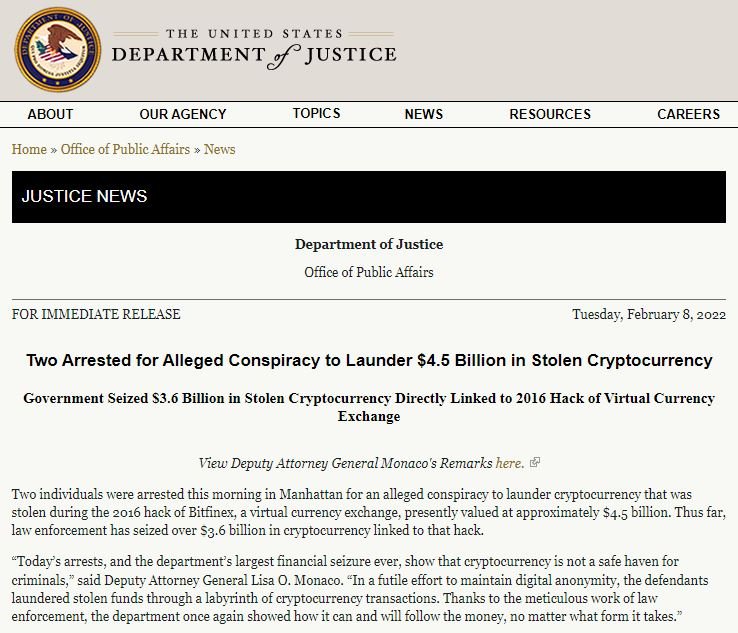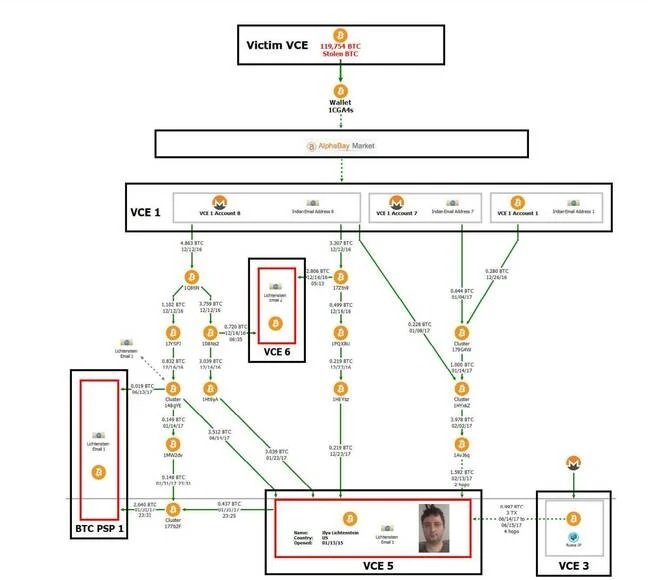The U.S. Department of Justice (DOJ) announced the arrest of two individuals accused of stealing more than $4.5 billion worth of cryptocurrency posing as tech entrepreneurs. The marriage formed by Ilya Lichtenstein and Heather Morgan is being charged with conspiracy to commit wire fraud and money laundering after stealing more than 110,000 Bitcoin from the Bitfinex platform in 2016.
Lisa Monaco, deputy attorney general, mentions that the defendants tried to erase their traces by conducting multiple transactions through various cryptocurrency exchange platforms, although law enforcement was able to track the activity all the way to the final destination of the compromised assets.

Authorities have already recovered around $3.6 billion USD of the stolen assets, so this operation has already achieved the largest seizure of virtual assets in history. It should be remembered that the fraud was committed in 2016, when a Bitcoin was valued at around $ 600 USD, so at the time the losses were estimated at almost $ 65 million USD, 10 times less than its current value.
According to authorities, Lichtenstein founded marketing firm MixRank and decentralized identity platform Endpass, while Morgan claimed on her LinkedIn account to be ceo of marketing firm SalesFolk, fashion designer and surrealist artist.

Employing their alleged jobs and money, the defendants started asking for cryptocurrency transactions from their victims claiming that these assets would be invested to get unusually high profits, an unmistakable symptom of fraud. The funds were stolen from the Bitfinex platform employing some 2,000 transactions and ended up in a cryptocurrency wallet controlled by Lichtenstein.
A couple of months later, the defendants began withdrawing a portion of the stolen Bitcoin by resorting to small transactions so as not to attract attention or, in cases of emergency, make it difficult for authorities to track them down. Still, authorities traced the stolen cryptocurrency to multiple accounts in the name of Lichtenstein, who at the time was residing in New York.
The defendants also resorted to the use of fictitious identities to carry out these fraudulent transactions, in addition to resorting to dark web exchange platforms and the exchange of Bitcoin for other cryptocurrencies. If found guilty, both defendants would face sentences of up to 20 years in prison on the money laundering charge and up to five years on the wire fraud charge.
To learn more about information security risks, malware variants, vulnerabilities and information technologies, feel free to access the International Institute of Cyber Security (IICS) websites.
He is a cyber security and malware researcher. He studied Computer Science and started working as a cyber security analyst in 2006. He is actively working as an cyber security investigator. He also worked for different security companies. His everyday job includes researching about new cyber security incidents. Also he has deep level of knowledge in enterprise security implementation.
